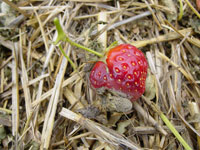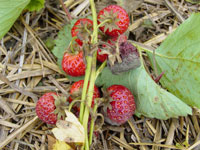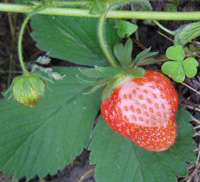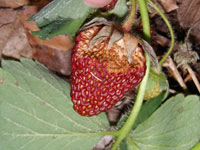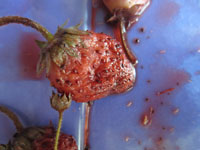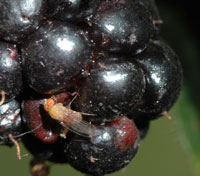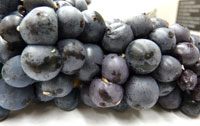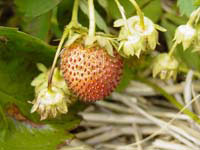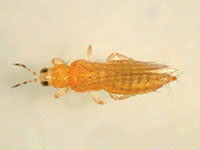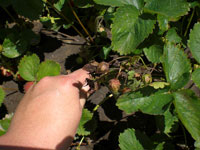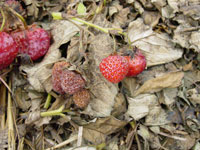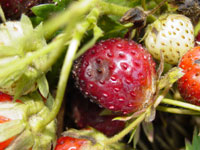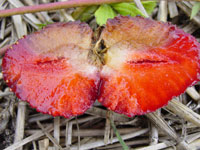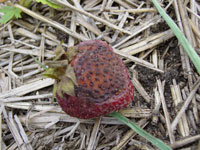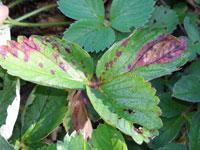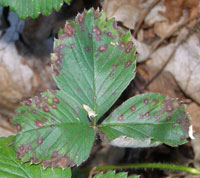Extension > Garden > Diagnose a problem > What's wrong with my plant? > Fruit > Strawberry > Discolored or rotten fruit
Strawberries > Fruit > Discolored or rotten fruit
1 of 7
Gray Mold
Botrytis cinerea
- Fruit develops indistinct, soft, light brown spots that rapidly enlarge and have a mild rotten smell
- Gray powdery spores form on infected fruit under moist conditions
- Disease favored by wet conditions and temperatures between 41-86F
- One or several flowers in a cluster may turn brown to black and dry out
- Black discoloration may extend down into the flower stalk
- More information on Gray Mold
2 of 7
Sunscald/Heat Stress
- Berries are pink to bronze where directly exposed to sun
- Berries have a pleasant, wine smell
- Occurs in extreme heat at/near harvest
3 of 7
Spotted Winged Drosophila
Drosophila Suzukii
- Active in gardens from July to September
- Larvae feed on healthy, intact, ripening fruits
- Larvae feed within the berries causing brown, sunken areas
- Fruit becomes soft and decays
- Adult flies are small (1/8 - 1/12 inch) long, yellowish-brown and red eyes, larvae are small (1/8” long), white and cylindrical
- More information on Spotted Winged Drosophila
4 of 7
Flower Thrips
Frankliniella occidentalis
- Feeding by thrips results in a berry that has a bronzed appearance
- Thrips are very small insects (approximately 3/10 inch long) have feathery wings and vary in color from yellow to dark brown; nymphs are white or yellowish with small dark eyes
- Thrips are present in early spring
- More on flower thrips
5 of 7
Leather Rot
Phytopthora cactorum
- A section of the berry or the entire fruit may turn tan, purple or brown
- Infected berries have a foul “chemical” odor and become tough, leathery
- Berries with any amount of infection are very bitter tasting
- Infects flowers, green fruit and ripe fruit
- Commonly occurs in low areas or where free standing water is present
- More information on Leather Rot
6 of 7
Anthracnose
Colletotrichum sp.
- Fruit will develop distinct round sunken brown to black blotches with no smell
- Wet pinkish orange sticky spores may form in the center of the fruit infection when wet
- Fruit rot can occur on green or ripe fruit
- Spots on leaves are small (<1/4"), round, sunken and gray-black, often resembling ink spots
- Flower infection results in dried out and brown flowers and flower stalks
- Occurs more frequently in very warm and humid weather (>80°F)
- More information on Anthracnose
7 of 7
Leaf Blight
Phomopsis obscurans
- First see purplish red round leaf spots with a gray brown center
- Spots grow into a large V shaped lesion with a dry brown triangle in the center and a reddish purple V shaped border
- Elongated, sunken, purplish brown or reddish brown spots or streaks may be seen on stems
- Berries can develop soft pink-brown spots
- More information on Leaf Blight



